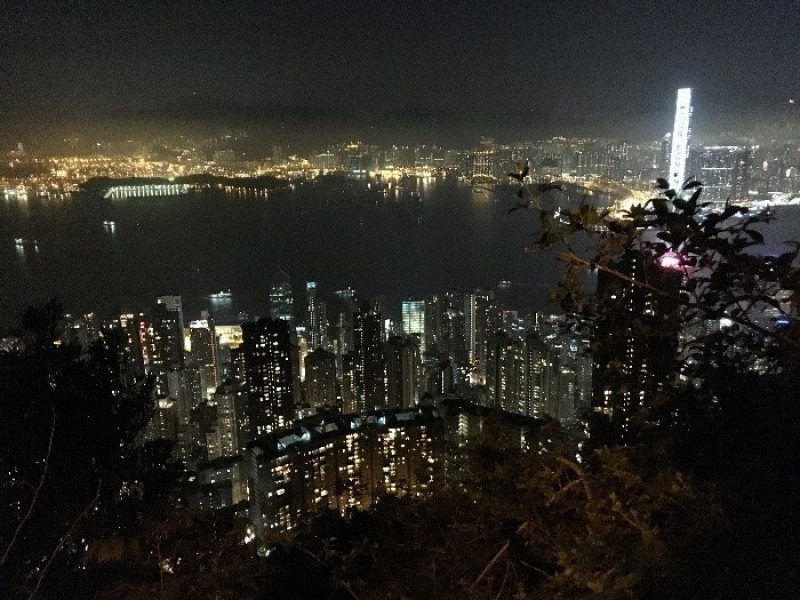The 12th International Temperate Reefs Symposium
Mathilde Bue
Aberystwyth University

I had the great opportunity to attend the 12th International Temperate Reef Symposium (ITRS) that took place in Hong Kong on the 6th to 11th January 2019. ITRS is the premier conference for marine scientists with a focus on temperate hard-bottom habitats. This meeting occurs every 3 years and attracts eminent researchers in the field. Thanks to the financial support from the Challenger Society and other societies I was able to attend this exciting symposium. I felt quite privileged to be able to present my research at an international conference.
When we arrived in Hong Kong, the nice ice-breaker on late Sunday afternoon set the tone for the coming week. It was lovely to recognise familiar faces from previous meetings. After catching up with people we ended up exploring the vibrant city of Hong Kong.
The symposium kicked off on Monday with an impressive opening ceremony, full of colour and tradition. Every day of the conference started with an interesting plenary talk by a mix of experienced and mid-career speakers. The session was then split into three, each with a defined theme. I found it sometimes difficult to decide where to go as there were so many good talks to attend! The quality of the talks was excellent, and it was very interesting to listen to the latest research in the field from eco-engineering to ecosystem functioning and to my excitement lots of kelp research! My talk was scheduled on Tuesday which meant that fortunately I would have the rest of the week to unwind and enjoy the conference. The talk was on the research that formed part of my PhD and was titled “kelp understory algal associated macroinvertebrate communities are likely to alter in a warmer, less complex ocean”. I used a macroecological approach and artificial seaweed units to explore the effects of habitat complexity and thermal environment on sub-canopy associated macroinvertebrate communities within kelp forests. Overall, this research has demonstrated clear thermal affinities in invertebrate community structure across 9 degrees of latitude. I was quite nervous to speak in front of leading researchers for the first time, but I quickly felt at ease with such a friendly atmosphere. Presenting my research on kelp forest ecology was a truly rewarding experience. I received constructive feedback and it led to engaging questions and discussion about my research with scientists and fellow PhD students. The poster session on Wednesday night was very good with lots of interesting ongoing research and a good way to talk to people in a friendly ambiance. The week flew by quickly and by Thursday I realised this was the last day of the conference. The week ended with a very fun symposium dinner. The food was interesting also sometimes peculiar with goose feet! It was great to see everyone dancing and singing along together sharing the same love for marine temperate research. ITRS is a big family and it felt great to be part of it. This symposium gave me the chance to meet a wide range of people at all stages of their careers from various institutes and universities around the world I feel invigorated, full of ideas and ready to complete the last leg of my PhD. While this was an amazing experience from scientific aspects, this symposium was also culturally interesting. Hong Kong is a vibrant city with impressive skyscrapers, rich traditions, lush nature and fascinating food. Overall, it was an amazing and enriching experience and I cannot wait to meet everyone again and to present more of my work in the next ITRS. I am truly grateful to the Challenger Society for the generous travel award that enabled me to attend the 12th ITRS and would like to thank the organisers for a great symposium.
My profile
I am in the final year of my PhD at Aberystwyth University, Wales. My research focuses on understanding the food web dynamics and flow of energy within kelp forest (Laminaria hyperborea) communities. During my PhD, I used a macroecological approach and artificial seaweed units to explore the effects of habitat complexity and thermal environment on sub-canopy associated macroinvertebrate communities within kelp forests. I also used a range of techniques including stomach contents analysis, baited remote underwater video and stable isotope approaches to try and disentangle the complex trophic links within kelp forests.
Latest News
Royal Society Publishing Photography Competition 2025
Please see a message from the Royal Society below:
We are delighted to announce that the 2025 Competition is now open for entries until 15 August for a chance to win £1000! The competition celebrates the power of photography in conveying the wonder of science happening all around us and photographs can be submitted in the categories of: Astronomy, Behaviour, Earth Science and Climatology, Ecology and Environmental Science, and Microimaging.
The competition is free to enter and open to anyone studying or working in science at graduate level or above. Category winners will receive a one-year membership to the Royal Photographic Society and the overall winner will receive a grand prize of £1,000. Find out more: https://bit.ly/RSPphotocomp
October 2025 MEDIN Workshop: Marine Data Management, Governance and the MEDIN toolset
The Marine Environmental Data and Information Network (MEDIN) are pleased to announce that registration is now open for the next occurrence of our popular free online training workshop: ‘Marine Data Management, Governance and the MEDIN toolset’ on the 13th – 17th October 2025 on OceanTeacher Global Academy.
Marine Data Management, Governance and the MEDIN toolset
The Marine Environmental Data and Information Network (MEDIN) and OceanWise are delighted to invite you to attend our popular free online training workshop: ‘Marine Data Management, Governance and the MEDIN toolset’ on the 19th – 23rd of May 2025.
